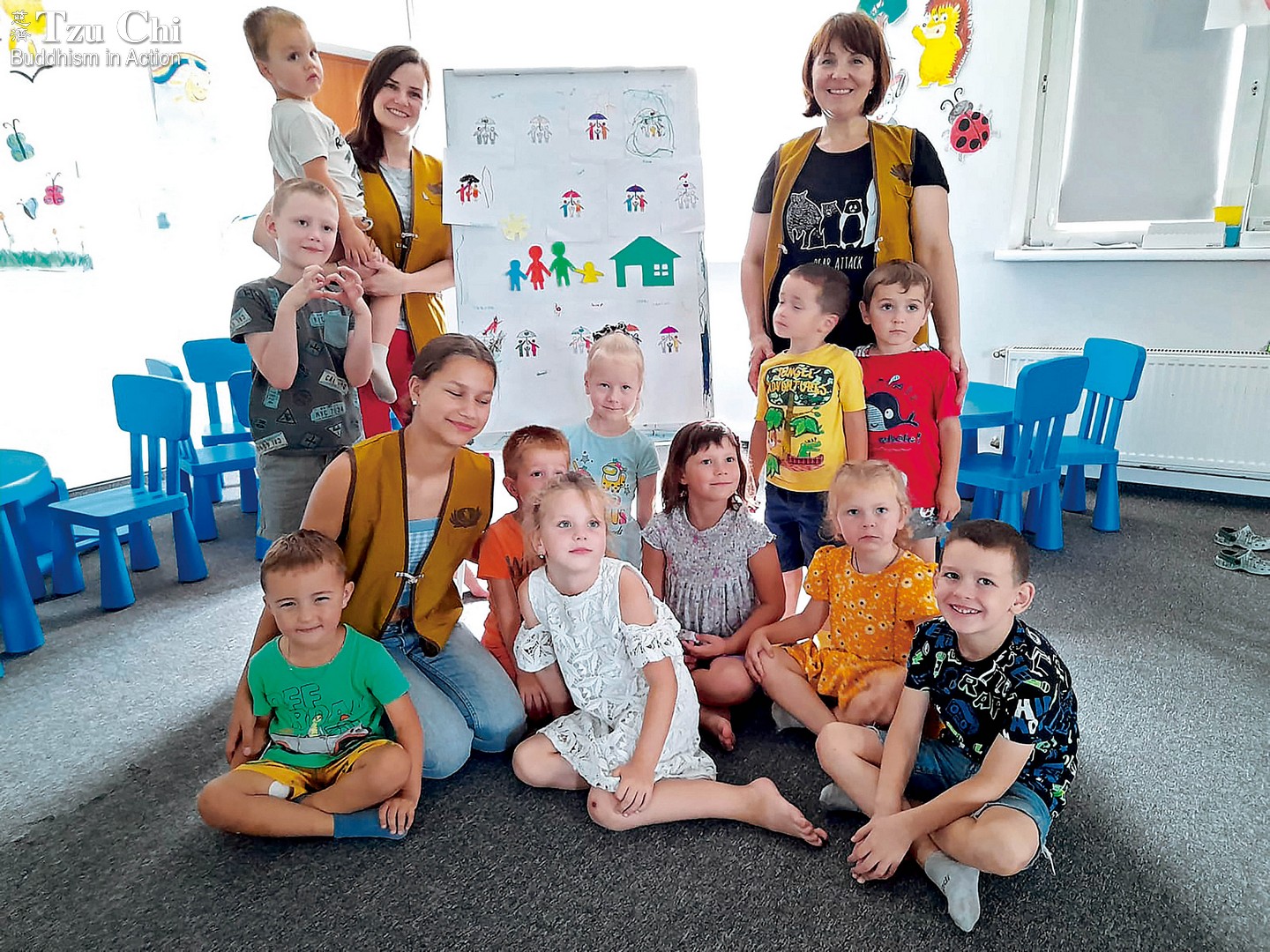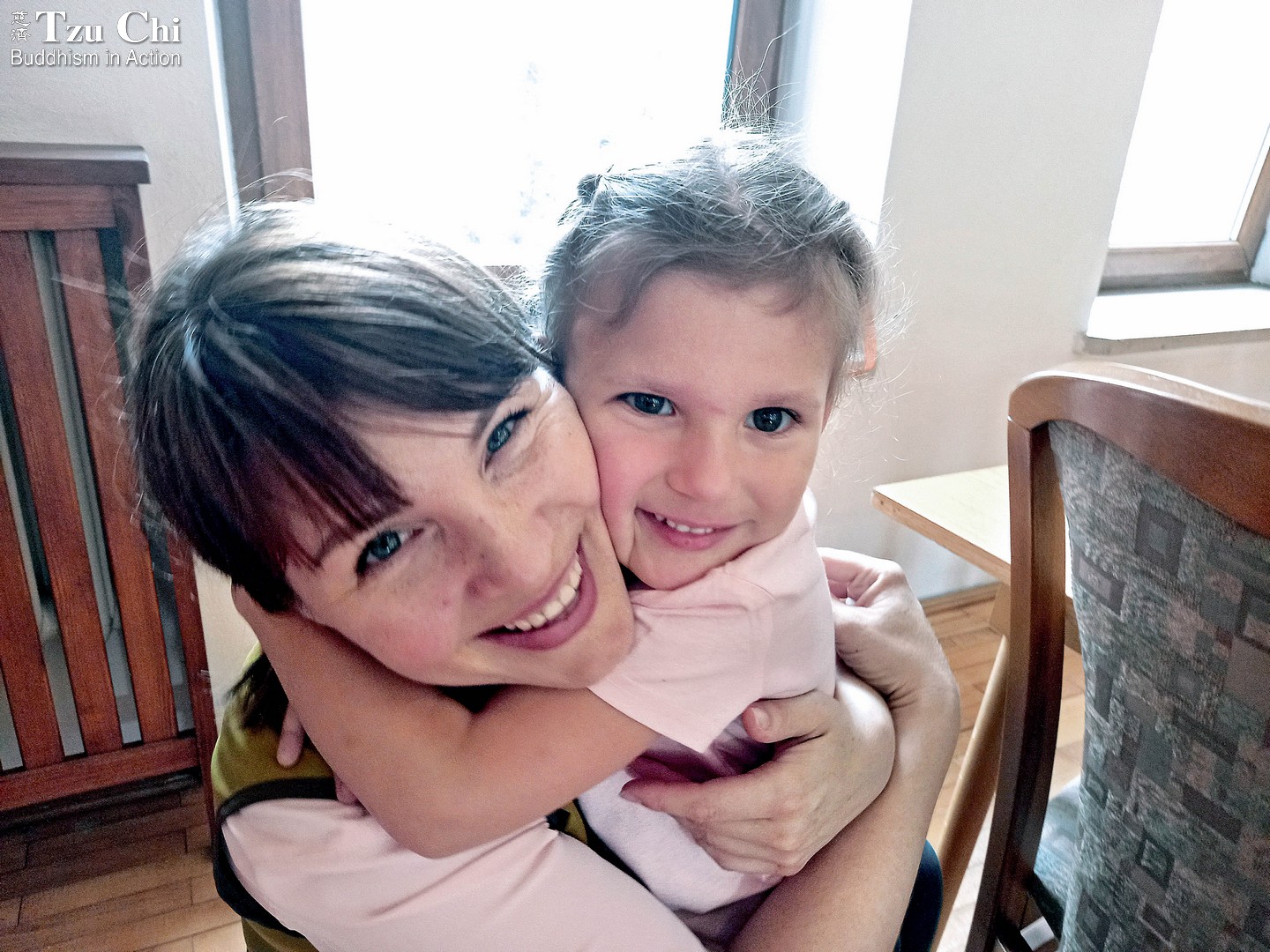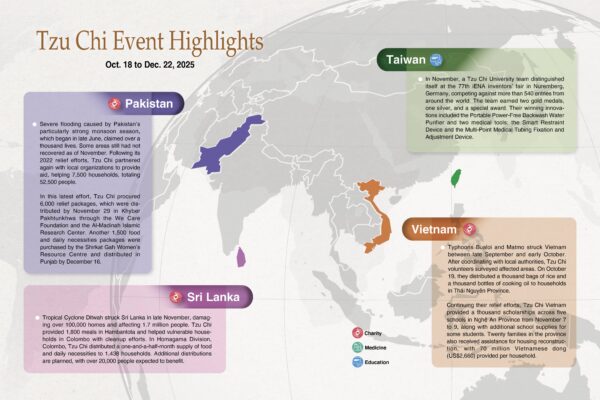By Marika Gvagvaliia
Photos by Anna Mankus
Taken from the home they knew, these Ukrainian children in Poland are learning positive life skills and values through Tzu Chi’s character education program.

Tzu Chi volunteers with their students of the preschool character education program
Many Ukrainian families with children were forced to leave their homes after Russia invaded Ukraine on February 24. Many of them fled to Poland, where they were forced to start a new life: find housing, start a new job, or begin school in a foreign land. Most children are scared or uncertain in their new environment; some have suffered traumatic experiences escaping the war. In response, Tzu Chi volunteers are providing Tzu Chi’s character education program, originally developed in the United States, to assist the children to heal and adapt to their new situation.
Helping Ukrainian refugee children solve life issues
Many Ukrainian mothers in Poland couldn’t go to work because of childcare issues, so the Camillian Mission for Social Assistance started a preschool and kindergarten in their shelter in Lomianki, together with the Polish Spynka Kindergarten Animation Group. As a part of their collaboration with the Camillians, Tzu Chi volunteers would often visit the shelter. They noticed that many of the children were scared and withdrawn. Among Tzu Chi’s Ukrainian volunteers in Poland, some had worked in education before escaping the war. After discussing ways they could help, they decided to start providing Tzu Chi’s character education to the children at the preschool.
The curriculum, which had been developed in English for preschool children in the United States, was translated into Ukrainian and adapted for differences in culture and educational styles. Sara Kao, Tzu Chi’s lead for the mission in Poland, explained: “It was a perfect match.” Superior Father Roman Zajac, director of the Camillian monastery in Lomianki, was very happy with Tzu Chi’s initiative to conduct the classes, expressing his enthusiastic support for the program.
The character education curriculum is developed for children ages three to six. It’s aimed at connecting teaching themes such as Respect, Compassion, Courage, Thankfulness, etc., to everyday life. It teaches the children to cultivate positive qualities and virtues that will help them solve challenges in various areas of their life, whether at home with their family, in kindergarten with other students, in the store, or on the playground.
At the beginning of the project, the children were emotionally closed off, stressed, and still attached to their mothers. Sometimes they cried and didn’t want to stay at the kindergarten. But they slowly began to open up over the course of the program, like flowers opening their petals.

Tzu Chi volunteers posing with their students of the character education program while studying the topic “Respect”
“We see the children begin to change”
Kindergarten teacher Oksana Horlenko, who moved from Ukraine to Poland 11 years ago, said: “We are very grateful to the Tzu Chi Foundation and Tzu Chi volunteers for implementing the program and helping children learn what kindness is, and for developing a sense of gratitude in children. We see the results of the work; we see how children begin to change and behave differently.”
She gave an example of a girl named Ksyusha, from Kharkiv, who was studying with them. She was constantly afraid at first, very withdrawn; she even sat under the table and was afraid to come out. “When the volunteers from Tzu Chi started coming,” Oksana explained, “we were able to show the child with our adult behavior that she was safe and that she could trust us. Ksyusha is completely different now. She communicates with the other children, and can talk to adults too.” Oksana said that she can give many such examples. She believes that the program, activities, and volunteers envelop the children in warmth and kindness.
She added that not every family will return to Ukraine because some have nowhere to return to. “Many people’s houses have been destroyed. That’s why this joint project was created, so that it would be easier for children to adapt to living here long term. We have one common goal, to show kindness to children, to show them that we need them.”
Character education makes an impact
Lesia Stepanenko is a refugee from the city of Netishyn in the Khmelnytskyi region of Ukraine, which is known for its electricity production. As the mother of a kindergarten child—and a kindergarten teacher herself—she shared her impressions of the curriculum: “The Tzu Chi organization came to our kindergarten and offered us their character education training program. We decided to go with it. We met the teachers from Tzu Chi, Ukrainian-speaking girls, with higher pedagogical education and extensive experience. They teach the children to speak words of courtesy and to help each other. As a teacher, I see positive results. Now, when there is a conflict, the children try to come to an agreement among themselves.”
She said that she can also see the results as a mother. Her youngest son, Zakhar, for example, has begun to negotiate with his elder brother, ten-year-old Makar. Zakhar also helps at home, joins in the cleaning, and prepares salads with her. “Zakhar has started to thank me; he hugs me,” said Lesia. “I can feel that the child has a warmth that he wants to share. It is very important for me.”
Now, she feels reassured. “My children have found a common language. I think it is due to the fact that we transferred all the positive experiences we received in the kindergarten to the family.” She pointed out that Makar has noticed changes in his younger brother too. The older brother said that Zakhar has started helping him more, listening to him, sharing and playing with him. He also mentioned that the relations between them have become warmer.
Another mother and a kindergarten teacher, Alyona Chaikovska, from Dnipro, Ukraine, learned about the kindergarten from Facebook and started taking her youngest four-year-old son there.
Alyona said her son really likes the kindergarten. He’s met friends from Ukraine who speak his language, so the place is like a part of home. “And we learned that character education is taught in the kindergarten,” said Alyona. “The children are taught to be kind, compassionate, grateful, polite.” She said her son now often says ”thank you,” asks permission when he wants to take something, doesn’t scatter things around, and cleans up after himself.
“For him, all this is interesting as an element of play, but he transfers these concepts to his own life. As a mother, I am pleased that my child is polite. And he has learned to negotiate with his peers.” She is grateful to Tzu Chi for the program activities. “They are very interesting and useful, and the children like them.”

Dina Brazhnyk with a student of the program. Сhildren openly demonstrate their emotions during learning.
Beautiful flowers of kindness
Dina Brazhnyk, a Tzu Chi volunteer and program teacher, told about her acquaintance with Tzu Chi. She had worked as a teacher in Ukraine and had started working for the foundation as a temporary volunteer, but after learning about the character education program for children, she became a permanent volunteer.
As Dina explains it, “The program is about respect, good actions, and humanity. We teach children how to behave in society, how to behave in the family, and how to love each member of the family.”
She said she values working in the program and that it really benefits the Ukrainian children. “The children arrived very tired, withdrawn, aggressive. Every child has his own story. At first they didn’t want to communicate with us, but gradually they opened up.
“We still have a lot to learn from Tzu Chi philosophy and to teach it to our children. These concepts have a very positive impact for the future of the children, and of the adults as well.” She felt that she learned a lot from Tzu Chi and can now pass it on to the students.
Dina points out that if you show children kindness from a young age, they will grow up to be good people. She explained it with a simple analogy: “If you plant a seed in the ground and take good care of it, a beautiful flower will grow.” And that’s exactly what these Tzu Chi teachers are doing: planting seeds of kindness and love to produce a field of beautiful flowers.



